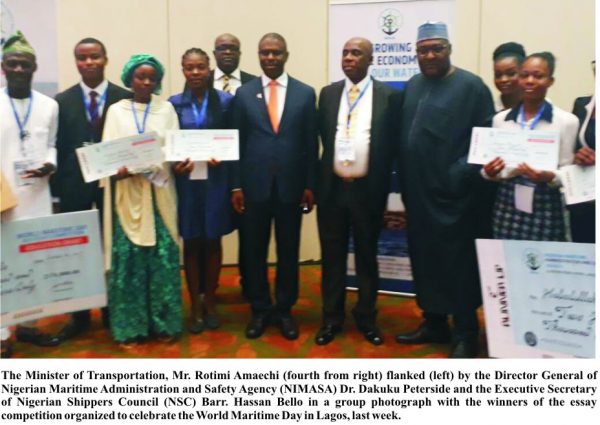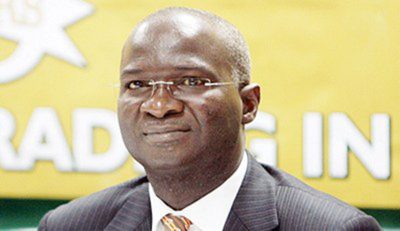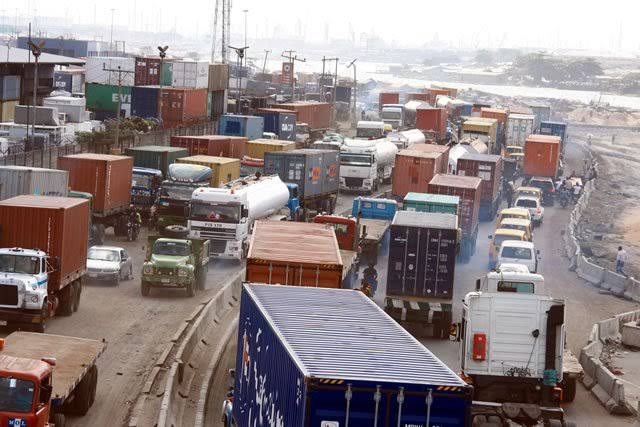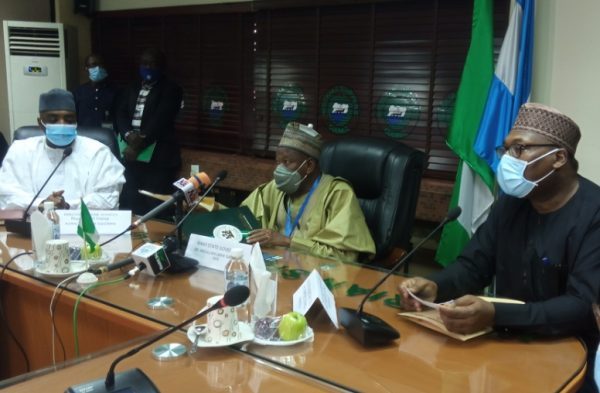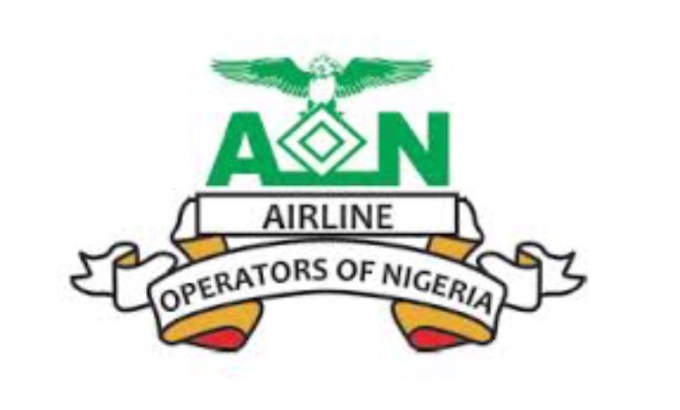NEWS LENS
Why Nigeria’s Emerging Deep Seaports Will Be Unviable
* Ambode Picks Lagos Trade Fair Complex to solve Apapa gridlock
By Kenneth Jukpor
The emerging deep seaports across Nigeria could be unviable and investor’s nightmare ultimately if some policy issues, seamless shipping variables and intermodal connectivity are not addressed.
According to experts, factors such as the cost of using the port, efficiency, timeliness and effective linkage systems via railways and waterways could play a significant role in the success of the various deep seaports springing up across Nigeria.
The rapid development of deep seaports in the West and Central African region, such as Ghana’s Tema port and Cameroon’s Kribi port, couple with the already viable Port of Cotonou, Benin; also means investors in deep seaport projects in Nigeria have a lot to consider before making such colossal investments.
Nigeria already has the Lagos Port Complex, Tin Can Island Port, Calabar Port, Delta Port, Rivers Port and Onne Port; with some river ports such Onitsha, Lokoja and Baru ports. However, several deep seaports projects are coming up in the nation with Ondo State pushing for Olukola port, Akwa Ibom developing Ibaka port, Edo State creating Gelegele port and Lagos is set to host Badagry and Lekki deep seaports.
There is definitely going to be an array of deep seaports in the country in the near future; but how would they compete? Would there be sufficient cargoes? Are there proper linkage systems?
Although, some of the recommendations in the communiqué from the World Maritime Day event in Lagos included that promoters of the deep sea ports should at the design stage include a plan of rail linkage to the port locations and highlighted the need for inter-agency collaboration in the maritime subsector, the future of deep seaports in Nigeria and the whole of West and Central Africa remains uncertain.
Speaking at the World Maritime Day event in Lagos, last week, the Executive Secretary of the Nigerian Shippers’ Council (NSC) Mr. Hassan Bello said that Nigeria might lose out in the impending rigorous jostling for cargoes amongst several deep seaports within the West and Central African region.
At the event which was organized by the Federal Ministry of Transportation to mark the International Maritime Organisation(IMO) annual World Maritime Day, Hassan raised salient questions begging answers in the nation’s transportation sector. They include; “What is the transport sector doing to diversify Nigeria’s economy? Every time we talk about having new ports because the ports in Apapa should be resting at the moment. But, where is the linkage to these new port projects across the nation?”
The Shippers’ Council boss also asserted that the development of deep seaports in neighbouring countries would mean additional competition which may cause more Nigerian cargoes to be routed through those ports especially as they are always waiting for Nigeria to take policy decisions before rejigging theirs.
“Neighbouring countries like Benin, Cameroon and Ghana are waiting for us to pronounce our budget and policies for shipping and they would take defensive actions because they’re all developing deep seaports and they are also building inland ports to enable them divert our cargoes. We should develop new deep seaports and have the right policies”, Hassan said.
Hassan stated that even if Nigeria is talking about regional integration, there is always going to be competition and Nigeria has to get its preferences right at the national level before talking about regional integration.
“Look at the development of seaports in Nigeria, where is the place of linkage at Lekki for example? How would the cargoes leave the ports? We can’t rely on the roads that we have in Lekki at the moment. We ought to look at these issues and look at inter-agency collaboration. This is a collective responsibility and all stakeholders have to sit down to decide the headway for transportation in this country.
“Few days ago, the Minister of Agriculture, Chief Audu Ogbeh lamented that his yams for export got to destination in a state that wasn’t fit for consumption and these are as a result of several issues. We have to look at the transportation chain and create the right infrastructure to support these kinds of exports.” He said.
According to the Chairman, Nigerian Ports Consultative Council, Otunba Kunle Folarin, it isn’t just the location of the ports that threatens to attract Nigerian cargoes to neighbouring ports; there are several other issues such as the cost, efficiency and quick turnaround time.
Folarin added:” These are the factors that would attract Nigerian shippers to those ports. If the services are poor; such ports wouldn’t attract Nigerian shippers. If the ports can’t guarantee the security of cargoes, efficiency and competitiveness; they wouldn’t attract Nigerian shippers.”
“These variables are very important and it doesn’t really matter if neighbouring ports are just 1km away from the Nigerian borders; without these variables they wouldn’t attract Nigerian cargoes. So, the fundamental issues are efficient and competitive ports that can guarantee quick turnaround time and competitive prices. Therefore, it is the combination of all these factors at neighbouring ports that would be a threat and not necessarily the proximity” he said.
Consequently, Otunba stressed that Nigeria should work towards ensuring its ports are competitive and efficient.
Speaking on the multiplicity of deep seaport projects across the country, Otunba admonished the promoters of these deep seaports to take an in-depth look at the competitive advantage.
“Before you start developing a Nigerian deep seaport, you must look at the advantages in comparison with the existing seaports and neighbouring ports. What are the advantages the intended port would have? The main benefit of a deep seaport is that it can accommodate bigger ships which refer to the comparative advantage of volume. This means the cost of freight would be lower and services would be improved. Nigeria needs deep seaports because developing the channel of existing ports to such level is very expensive.
Deepening the existing ports isn’t the ideal solution; in fact, the answer is to create an infrastructure that would enable the ports to be serviced by lower freight cost and bigger volume of ships. Cargoes would arrive quickly if they can arrive in large volumes. So, deep seaports would be an answer to all the challenges associated with freight management and arrival schedule for goods and services for Nigerian commerce.” Otunba added.
Other germane recommendations in the WMD communique include: The call for an inland waterways trust fund model to boost private sector participation in the provision of inland waterways services and requisite policy and legislative framework that would provide enabling environment for inland water transport to thrive.
The report noted that to integrate effective usage of Inland Waterways to the transportation chain, there is need for sustained channel management inclusive of dredging, hydrographic survey, channel marking, etc.; that there should be healthy collaboration between host states and the National Inland Waterways Authority (NIWA) which the constitution has saddled with the development and regulation of the Nigerian Inland Waterways.
The communiqué also recommended that to attract private sector participation in inland ports and inland transport operations, government should explore the option of brown field concession by providing basic infrastructure and that seamless integration between inland port and sea port should be encouraged for effective modal shift and over reliance on the road mode.
Adequate data on traffic flows was proposed to facilitate operational projections and development of traffic sharing between the various transports modes with the river information services (RIS) model specifically recommended.
The communiqué also highlighted the need to present the draft National Maritime Transport Policy to stakeholders in readiness for its approval by the Federal Executive Council (FEC), which will drive a coordinated development, regulation and collaboration of the various agencies in the maritime industry and terminal operators were admonished to support the inland waterways for the development of new logistics platform.
On security, the communiqué recommended that a robust security and insurance arrangement be put in place to ensure investors and service users’ confidence in the patronage of the inland waterways and that the Nigerian Navy forward operational base be moved nearer to the changing maritime shipping operational frontiers.
In another development, as part of efforts to resolve the unending traffic mayhem on the Oshodi-Apapa road, the Governor of Lagos State, Mr. Akinwunmi Ambode has sited the Lagos International Trade Fair as an ideal location for a container holding bay.
A delegation from the Transport Ministry in Lagos, led by Engr. Olatunde Davies made this claim when they paid a working visit/ inspection of the available space at the Trade Fair Complex on Wednesday, last week.
Engr. Davies who is also part of the steering committee by the Lagos State government to resolve the accessibility of the Apapa port roads, revealed that the committee had considered declaring a state of emergency at Apapa.
“The Lagos State government has met with various stakeholders at the Apapa port and the Governor Akinwunmi Ambode is concerned. The Lagos International Trade Fair has been highlighted as a location that could accommodate the empty containers that are responsible for clogging the Apapa port roads. This was in our communiqué and we are here to take pictures, and see the facility on ground” Davies said.
Engr. Davies also lamented that the major impediment to resolving the Apapa traffic crisis would be the inability of the State Governor to take decisions that would affect Federal Government agencies like the Nigerian Ports Authority (NPA).
However, he expressed optimism that the fact that the ruling party at the Federal level and the State was the same, All Progressives Congress (APC). He added that this advantage would enable the Presidency and the State government quickly reach an agreement to resolve the Apapa traffic situation.
Meanwhile, the Legal Counsel to Aulic Nigeria Limited, concessionaires of Trade Fair Complex, Barr. Dan Udeh who received the Transport Ministry delegation, stated that the facility at the Complex could effectively accommodate over 200,000 containers.
“Apapa used to be popular as one of the rich Local Government Areas in Lagos and also one of the choicest places to live or do business but as at today I am not sure Apapa can boast of such revenue or such dream city. We have the facility and capacity to deal with all the empty containers. We also have an off-dock terminal but all empty containers in Apapa can be moved to Aulic. This location can take over 200,000 containers and when you remove that figure from Apapa and utilize a call-up system; you would find that the roads can be accessible at all times” Barr. Dan said.
Dan Udeh added that the Nigerian government should also demand more from shipping companies and terminal operators and not just be content with taxes. “It is not just about paying tax but also the company’s Corporate Social Responsibility (CSR). Most of these foreign companies also operate in other countries but not in such haphazard manner. They should also think of how to ensure that the environment is healthy and business friendly” He said.
Copyright MMS Plus.
All rights reserved. This material, and other digital content on this website, may not be reproduced, published, broadcast, rewritten or redistributed in whole or in part without prior express written permission from KINGS COMMUNICATIONS LIMITED

